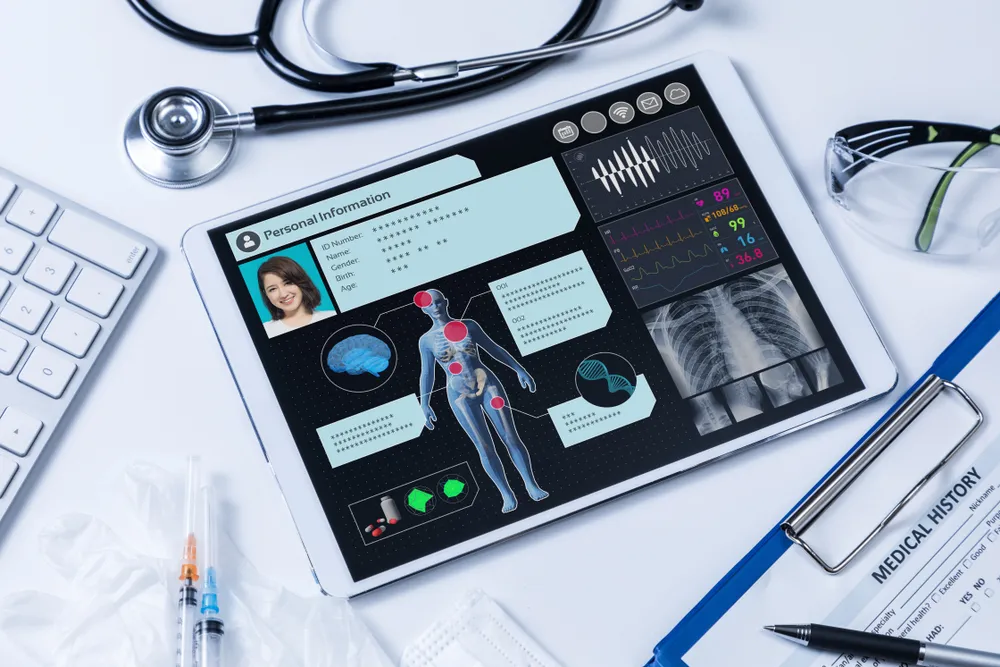After working with hundreds of doctors across the United States, we’ve realized that running a small medical practice comes with unique challenges. From limited staff to tight schedules, there’s no room for systems that...
Are you one of those chiropractors spending excessive time and effort managing piles of paper-based patient records? If so, it's high time to consider adopting the alternative that's transforming the healthcare sector. EHR for chiropractic clinics is now indispensable because it frees up time wasted on administrative tasks, allowing you to focus on providing optimal patient care.
With the world's shift towards digitalization, EHR adoption has surged in the healthcare sector. Official data reveals that nearly 96% of general acute care hospitals have chosen to implement EHR software. These statistics highlight the increasing importance of EHR software integration in all healthcare setups, including chiropractic clinics.
Here, we discuss the essential features to look for in chiropractic EHR software once you decide to abandon outdated paper-based medical records for a far more efficient alternative.
1. Patient Portal
An essential feature to seek in an EHR for chiropractic clinics is an intuitive Patient Portal. This invaluable tool grants patients round-the-clock access to their health records through a secure platform. Moreover, patients can update their contact information, view educational resources, securely communicate with their chiropractors, and more with a resourceful Patient Portal.
Furthermore, an easy-to-navigate Patient Portal streamlines communication, allowing chiropractors to interact efficiently with their patients between visits. This not only enhances patient engagement but also saves time for practitioners. In a modern chiropractic practice, the Patient Portal is a fundamental feature for promoting patient involvement and efficient care delivery.
2. Integrated Clearinghouse
Another crucial feature to consider when selecting chiropractic EHR software is the Integrated Clearinghouse. This feature significantly reduces the probability of claim rejections and speeds up the claim submission process. Moreover, the medical billing workflow becomes even more efficient with built-in automation for follow-up and denial management.
Furthermore, an Integrated Clearinghouse simplifies the often complex task of managing claims, helping chiropractors minimize revenue loss due to rejections, denials, or delays. This seamless integration enhances practice revenue and ensures that claims are processed promptly, contributing to the financial success of the chiropractic clinic.
3. Integrated Practice Management
Integrated practice management is another essential feature that chiropractors should look for in EHR software. This feature ensures seamless coordination between clinical and administrative aspects of the practice. Moreover, it combines practice management and electronic health records (EHR) capabilities into a unified system, streamlining operations.
By having a unified solution, chiropractors can effortlessly manage scheduling, billing, and patient records from a single interface. Hence, it reduces administrative burden and enhances overall practice efficiency, leading to improved patient care. Furthermore, Integrated Practice Management empowers chiropractors to deliver services more effectively while simplifying day-to-day operations for their staff.
4. Scheduling
Practical scheduling tools allow chiropractors to efficiently manage patient appointments, reducing wait times and optimizing daily workflows. Moreover, this feature allows for the customization of appointment types, duration, and resources while providing real-time information about the availability of chiropractors and treatment rooms. Additionally, the integration of automated appointment reminders helps reduce no-shows and improve patient engagement.
Practice EHR offers a reliable and intuitive scheduling feature. By having a comprehensive scheduling feature in their EHR system, chiropractors can enhance the patient experience, increase operational efficiency, and ultimately deliver optimal patient care. Furthermore, this feature ensures that appointments are well-organized and align with the specific requirements of each patient, contributing to the practice's overall success.
5. KIOSK
Opting for chiropractic EHR software with a KIOSK feature can significantly enhance the patient check-in process and overall clinic efficiency. KIOSKs are self-service stations that allow patients to check in, update their information, and complete necessary forms without direct staff involvement.
Hence, this feature streamlines the check-in process, reducing wait times and ensuring accurate patient information. Moreover, patients can conveniently verify their details, insurance information, and medical history, leading to more accurate and efficient care.
A KIOSK feature, like Practice EHR’s KIOSK, contributes to a positive patient experience, demonstrates a commitment to leveraging technology for improved healthcare, and optimizes a practice's operational efficiency. Furthermore, the simplicity and convenience of self-service check-in can set a chiropractic clinic apart in providing high-quality, patient-centered care.
6. Charting Tool
An essential feature to look for in an EHR for chiropractic clinics is a user-friendly and efficient charting tool. That’s because time is at a premium in chiropractic clinics, where chiropractors often work with the same patients over multiple visits for similar issues. Manually entering repetitive information into patient notes can be a time-consuming and frustrating process.
An intuitive Charting Tool allows chiropractors to streamline the appointment process. It enables easy data entry, including patient information, medical history, and progress notes. With the ability to create templates for common conditions and treatments, chiropractors can quickly generate accurate records, saving valuable time and ensuring the focus remains on patient care.
Moreover, incorporating a charting tool in your chiropractic EHR software reduces administrative burdens, enhances practice efficiency, and supports more personalized patient care. Furthermore, by automating repetitive tasks, chiropractors can dedicate more time to diagnosing, treating, and delivering optimal patient care.

What Does the Best EHR Software for Chiropractors Look Like?
The best chiropractic EHR software offers much more than these features to streamline practice management. Here is what the best EHR for chiropractic clinics looks like:
1. It is Intuitive
A chiropractic EHR software should offer user-friendly navigation, logical organization of features, and straightforward data entry. Moreover, chiropractors must easily access patient records, update information, and generate progress notes without undue effort. A well-designed interface ensures that experienced chiropractors and those new to EHR systems can efficiently utilize the software. Thus, it should enhance productivity and benefit patient care.
2. It is Cost-Effective
Chiropractors must evaluate the overall cost of EHR implementation, including licensing, training, and maintenance. However, cost-effectiveness doesn't mean compromising quality. Instead, it involves selecting an EHR system that provides the necessary features without unnecessary add-ons that can inflate costs. Furthermore, affordable EHR software can streamline practice management and improve productivity without breaking the bank.
3. It Offers Exceptional Customer Support
Exceptional customer support is a cornerstone of the best chiropractic EHR software. When chiropractors encounter technical issues or need assistance, they rely on prompt support to keep their practices running smoothly. Therefore, top EHR systems offer accessible customer support through various channels, such as phone, email, or live chat. A responsive support team ensures chiropractors can quickly resolve concerns or questions. Hence, chiropractors can rest assured that help is just a call or message away when needed.
4. It Offers Cloud-Based Storage
With cloud-based storage, chiropractors can access patient records from anywhere, whether in the office, at home, or even on the go. This convenience improves patient care by providing quick access to critical patient information. Additionally, cloud storage is highly secure, safeguarding patient data against physical loss or theft. It also offers automatic backups, reducing the risk of data loss. Moreover, as your practice grows, cloud-based storage easily scales to accommodate increased data storage needs.

Practice EHR - ONE-Stop Solution for Chiropractic Clinics!
Equipped with all the essential features monumental to a chiropractic clinic’s streamlined operation and financial success, Practice EHR offers a one-stop solution for all your needs. From an intuitive patient portal to an integrated practice management and clearinghouse, Practice EHR ensures that your journey from patient scheduling to claim reimbursement remains smooth and hassle-free.
Take your first step toward streamlined practice management and ultimate patient satisfaction with Practice EHR by requesting a demo now!
Topics: Patient Care, EHR Solution, Specialty-Specific EHR, digital age, Medical Billing, RCM, EHR, Kiosk, EHR Features, ePrescribing, EHR for Chiropractors, Chiropractic EHR
RECENT POSTS



TOPICS
- EHR Solution (167)
- EHR (105)
- Patient Care (98)
- digital age (98)
- Specialty-Specific EHR (91)
- Medical Billing (80)
- Technology in Healthcare (76)
- Industry Update (71)
- EHR Features (63)
- Integrated EHR (59)
- Small Practice (57)
- Medical billing services (53)
- RCM (53)
- New Technology (47)
- HIPAA Security (41)
- Cloud-based EHR (38)
- Practice EHR News (38)
- Healthcare Office Management (37)
- Kiosk (29)
- Telemedicine (29)
- Revenue Cycle Management (21)
- ePrescribing (21)
- EMR (12)
- AI Solutions (11)
- Practice Management Software (11)
- Client Favorites (10)
- Practice Automation (10)
- TeleVisit (10)
- The ONE (10)
- AI Scribing (8)
- Patient Portal (8)
- Urgent Care (8)
- MACRA/MIPS (7)
- Product Updates (6)
- Switching to New EHR (6)
- events (6)
- E-Prescribing (5)
- Insider (4)
- Internal Medicine EHR (4)
- MIPS (4)
- Orthopedics EHR (4)
- Podiatry (4)
- Podiatry EHR (4)
- AI EHR (3)
- AI scanning (3)
- Digital Experiences (3)
- Family Medicine EHR (3)
- HIPAA (3)
- MIPS Reporting (3)
- Regulatory Updates (3)
- Telehealth Platform (3)
- Telehealth Platforms (3)
- Best EHR Software (2)
- Billing for Private Practices (2)
- Chiropractic EHR (2)
- Clearinghouse (2)
- Dermatology EHR (2)
- EHR Scheduling (2)
- EHR for Chiropractors (2)
- Foot and Ankle Care (2)
- Foot and Ankle EHR (2)
- Health records 101 (2)
- Integrated Practice Management (2)
- Medical Credentialing (2)
- Medical Practice Management Software (2)
- Mobile EHR (2)
- Patient Check-in Kiosk (2)
- Psychiatry EHR (2)
- Quality of Patient Care (2)
- Reporting Under MIPS (2)
- Risk and Liability in Medical Settings (2)
- What Works Clearinghouse (2)
- AI-powered Medical Billing (1)
- Bariatric EHR (1)
- Behavioral Health Practices (1)
- Billing Communication (1)
- Cardiology EHR (1)
- Cash Flow (1)
- Data Security (1)
- Dos and Don'ts (1)
- EHR Guides (1)
- EHR Implementation (1)
- EHR KPIs (1)
- EHR Questions to Ask (1)
- EHR for Chronic Illness (1)
- EHR for Small Practices (1)
- EMR vs EHR Difference (1)
- ENT EHR (1)
- Eligibility Verification in Medical Billing (1)
- Endocrinology EHR (1)
- Family Medicine (1)
- Gastroenterology (1)
- Gastroenterology EHR (1)
- General Surgery EHR (1)
- Geriatric AI scribe (1)
- Geriatrics EHR (1)
- Guides (1)
- Healthcare Compliance Certification (1)
- Healthcare Practice Office Management (1)
- Help Center Videos (1)
- Insurance Reimbursement (1)
- KPI (1)
- Key Performance Indicators (1)
- Lab Processing (1)
- MACRA (1)
- Medical Billing Partner (1)
- Medical Coding Services (1)
- Nephrology EHR (1)
- Neurology EHR (1)
- Pain Management EHR (1)
- Pediatrics EHR (1)
- Physical Therapy EHR (1)
- Practice Cash Flow (1)
- PracticeEHR GO App (1)
- Pulmonology EHR (1)
- Reconsider Your EHR (1)
- Simplify Practice Management (1)
- Staffing in Healthcare (1)
- Switch Medical Billing Providers (1)
- Urgent Care Medical Billing (1)
- Urology EHR (1)
- insurance claim denials (1)







